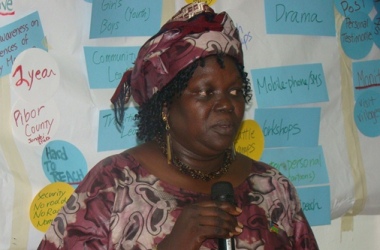Over 90% of diseases in S. Sudan preventable, official
September 26, 2011 (JUBA) — More than 90 per cent of diseases that affect millions of the population in Africa’s newest nation can easily be prevented, provided the right messages are disseminated among community members, a senior health officials has disclosed.

“Prevention is better than cure and as trained communicators, you need to sensitize the masses using messages that can change the behaviours of people in your various communities,” she told attendees drawn from all the 10 South Sudan states.
Itto, who also doubles as the acting director general for community and public health within the same ministry said albeit the South still lacks enough midwives and nurses needed to support the much needed community health workers, efforts are underway to improve the situation.
She noted, “If you want to deliver services that have health impact in society, there is need for the proper training of community health workers who will help disseminate health related information at household levels.”
The senior health official specifically cited Ethiopia, a country where focus on preventable diseases in society, is reportedly prioritized ahead of service delivery nationwide.
The need to implement community-led total sanitation in the South Sudan context, create clear terms of references to guide stakeholders, building capacities of development partner to co-ordinate with their state-level counterparts were some of the key issues discussed during the workshop held in Juba, the South Sudan capital.
To-date, however, the health sector in South Sudan, a region that suffered from over two decades of civil war with the north, remains extremely weak. The young new nation still continues to face significant health challenges.
For instance, according to the 2006 South Sudan Household Health Survey (SSHHS), the country has one of the highest maternal mortality ratios in the world at 2,054 deaths per 100,000 live births. Under-five mortality was at 135 deaths per 1,000 live births, according to the same survey.
“Lack of sufficient trained staff, supplies, drugs, and equipment create challenges in improving the health status of the people of South Sudan,” party reads a section of the SSHHS report.
(ST)

SAF
Over 90% of diseases in S. Sudan preventable, official
Yes majority of the diseases that are causing death in the third world counties including our so-called RoSS today are microbial in origin and thus are preventable if kids and other vulnerable members of the public are vaccinated and if simple and cheap but lifesaving procedures such as personal, food and water hygiene are introduced to the public by the so-called ministry of health of RoSS!! I
Isaac Khamis
Over 90% of diseases in S. Sudan preventable, official
You are right because before the war erupted in 1983 there were no many different diseases but when all civil populations went and seek refugee in countries borders us has resulted of many diseases that even were not been to our country before.
Would please Advise women to take care of the country health system because men we don,t care because we are addicted to beautyful women and sex.